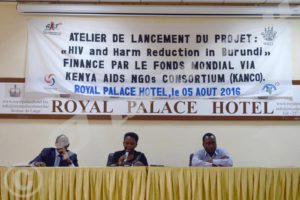The “Burundian Alliance against HIV/AIDS and for Health promotion-ABS” launched on 5 August a new project “HIV and Harm reduction in East Africa” targeting people who inject drugs –PWID.

Dr. Josélyne Nsanzerugeze (in the middle): “With this project, we expect to conduct a rapid assessment of the link between HIV / AIDS and PWID in Burundi”
Several reasons explain the paramount importance of this project. They include a high number of the PWID in the region, HIV prevalence among PWID, legal barriers to access health care, a weak voice of PWID and inadequate data to inform programing. Then, the new project launched by ABS in collaboration with the Health Ministry and Kenya AIDS NGOs Consortium will create a conducive environment to support harm reduction services and strengthen communities.
However, two challenges are still observed: the legal procedure barriers for registration of networks of PWID and the late disbursement of funds.
For Gérard Mbonabuca, the ABS legal representative, HIV and harm reduction is a new project in Burundi health domain that will target PWID beside other vulnerable and discriminated groups. “It will identify some challenges and find solutions thanks to the good collaboration with other national and regional organizations”, he said.
Matthew Ken, the coordinator of Kenya AIDS NGOs Consortium (KANCO) indicated that the community stigma is a big challenge and needs to be tackled. “Injecting drugs is a reality but we need to identify the users”, he said. Ken went on to say that according to the current statistics, Sub-Saharan Africa has 75% of the entire global HIV/AIDS epidemic while EAC has 30%. “That is serious. We cannot accept that people keep dying of HIV/AIDS when we know what needs to be done”, he stressed.
An opportunity to identify PWID
For Dr. Josélyne Nsanzerugeze, Assistant to the Public Health Minister, the HIV infection risk among people who inject drugs is accompanied by Hepatitis C (HVC) estimated at 700 out of 10000 people in Burundi. Similarly, she continued to say that the results of “PLACE” study indicates a prevalence of 4.8% among men who have sex with men and 21.3% among female sex workers (2013) but no relative data to injection drug use. “With this project, we expect to conduct a rapid assessment of the link between HIV / AIDS and PWID in Burundi”, she underlined.
Ntirampeba Damien, in of charge of Intelligence services and operation within the police unit against drugs indicated that this project will help the police sensitize notably youths about its wrong effects. “We have finally found that jailing drugs’ users is not a solution. They should rather be reeducated”, he said.
The project was funded by Global Fund with an amount of USD 5, 5 million for six countries- Burundi, Kenya, Uganda, Tanzania, Ethiopia, Zanzibar, Mauritius and Seychelles.
Testimony
“Drugs are very harmful to heath”, says Richard, a former drug user, three years ago. He indicated that it was difficult to give up drugs. “I started injecting drugs when I was in secondary school. Step by step, I became dependent and started to mix different products such as injectable drugs and tablets at the same time”, he said. As a guitarist, Richard was always in fiesta with his friends. The latter consumed cocaine. “I finished my academic studies without any problem and I hadn’t any sign proving that I was a consumer of drugs except my red eyes,” he stated. After few years, Richard lost weight of 41 kg in six months. As he was stigmatized, it was very hard and difficult for him to give up drugs. Thanks to the support of his few friends, Richard succeeded to come off these injectable drugs, three years ago. “I had replaced the drugs by doing physical exercises, I no longer use drugs and I got married”, he said.



















 IWACU Open Data
IWACU Open Data

